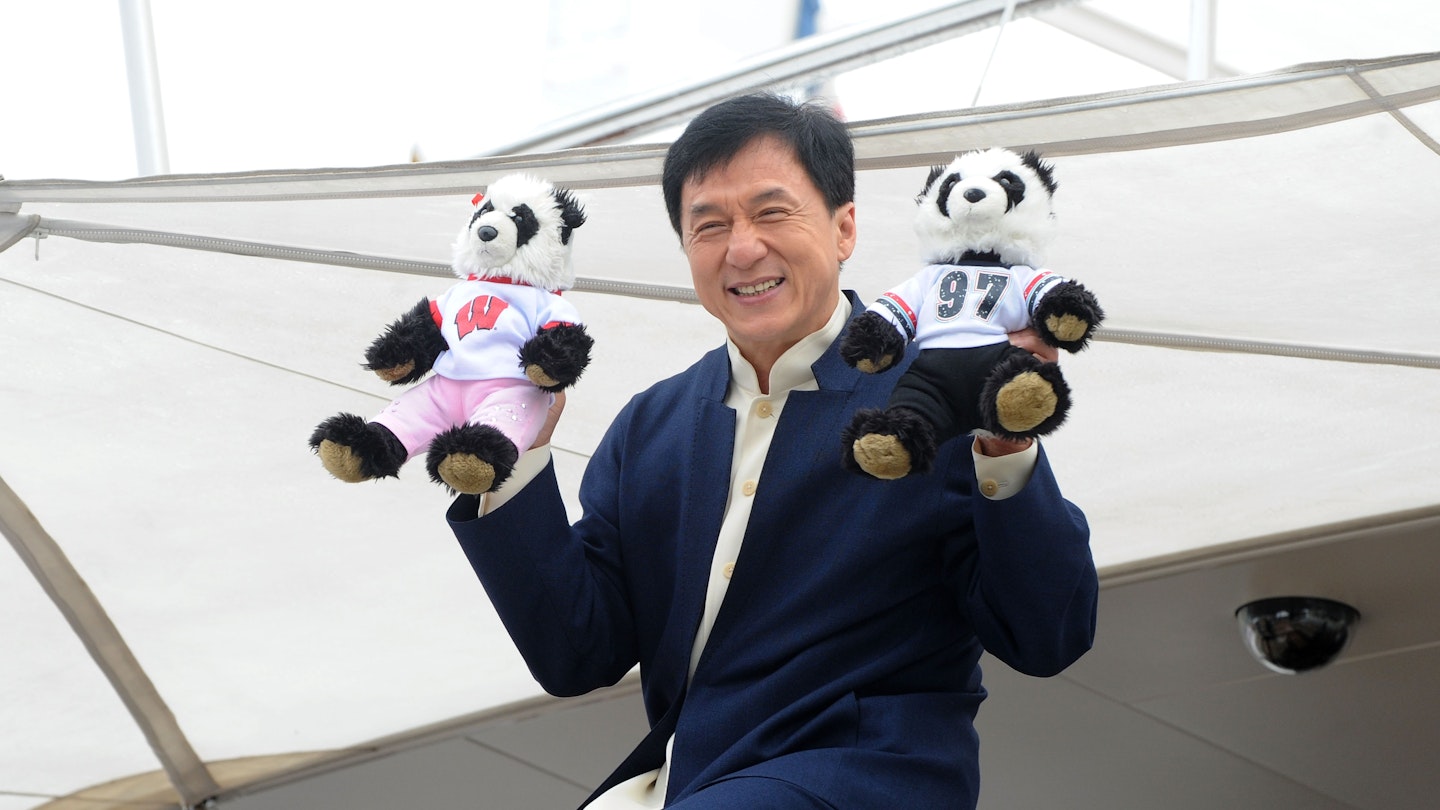This feature was originally published in our December 2010 issue
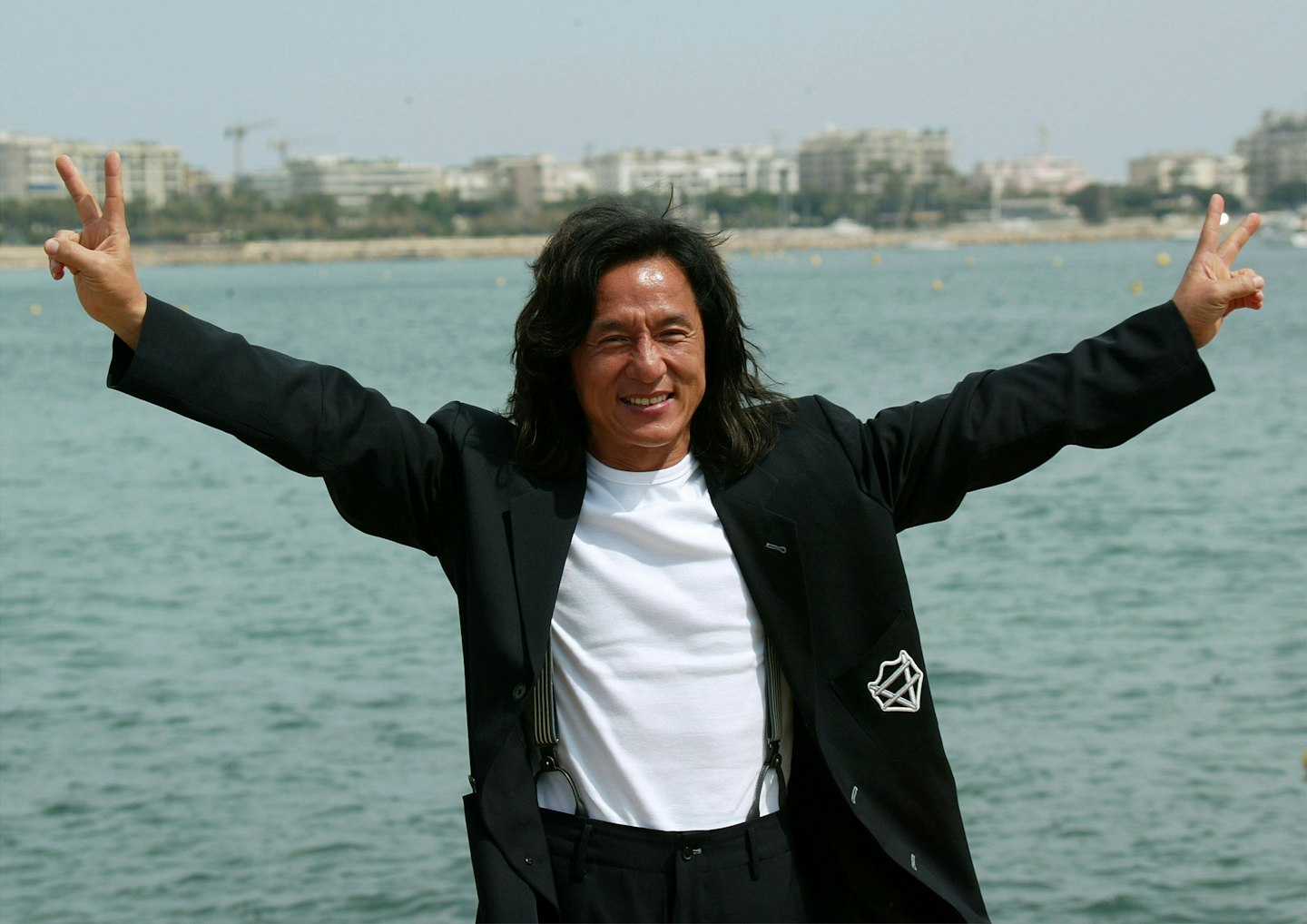
Saturday, September 18, 2010. It’s 10.30pm and the moon is waxing large in the Shanghai sky. This is no surprise, considering it’s just a few days before Zhongqiu Festival, aka Moon Day, the annual Chinese lunar celebration. Red and purple fireworks are already exploding in the clouds.
Which is all very nice, but it doesn’t explain why Empire is currently speeding down a freeway in a sleek, black BMW. Nor does it explain why Jackie Chan is at the wheel. And it really, really doesn’t even come close to explaining why Chan is singing along, at the top of his voice, to Lionel Richie’s anthem, One World.
“All this fighting cannot get us very far,” croons Richie.
“If we don’t stop and see just who we really are,” ripostes Chan.
“Can’t go far... Can’t go far... Whoooaaa!” the two sing together.
Empire would join in on the “Whoooaaa!” if we weren’t too busy gripping the sides of our seat.
Chan drives like a man who launches himself off rooftops without a safety net. (Which makes sense, because he is.) Under his expert guidance, the BMW weaves between lanes at breathtaking velocity. As we veer around the side of a lorry and our A-list chauffeur hits another sweet note, he lifts his hands off the wheel, raising them to the sky. And the thought flashes across our mind: “This could be it.”
But given the 24 hours we’ve just had, it would be a hell of a way to go.
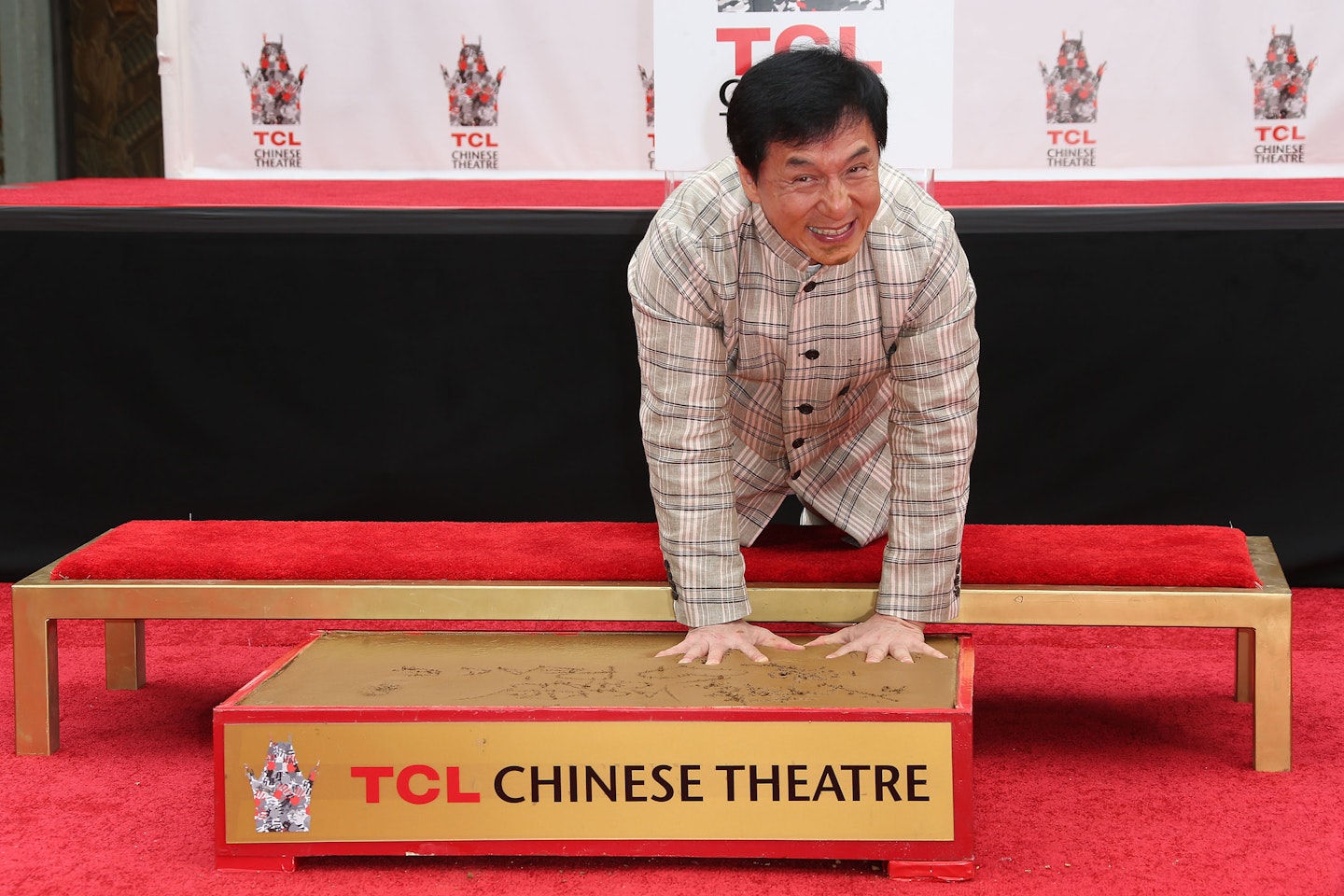
Jackie Chan is the greatest action star on the planet — no debate. Arnie has never snowboarded off a cliff, grabbing on to a helicopter before dropping 100 feet into a half-frozen lake (First Strike). Jason Statham has never launched himself into a bed of actual red-hot coals (Drunken Master II). And, unless his Harvard hazing was really wild, we’re pretty sure Matt Damon has never slid down a 70-foot pole with live electrical lines attached to it (Police Story). Over four decades, Chan has blended violence and comedy in ways that would have blown the mind of his hero, Buster Keaton. He’s taken pride in designing and performing his own, ever more outrageous stunts, in the process breaking almost every bone in his body (including most of his ribs, his kneecaps, an elbow and both cheekbones). The injuries are documented as blooper reels at the end of many of his films; the successful exploits are studied in micro-detail by both fans (see YouTube for countless montages) and academics (one thesis is called ‘Trans-regional Circulation Of Jackie Chan’s Image In The Late Cold War Years’ East Asia’).
But despite his fame, the 56-year-old remains an enigmatic figure. While he does regular press tours for his films — most recently travelling the world this summer to promote the remake of The Karate Kid — he rarely agrees to interviews of significant length. So who is the real man behind the myth (and, indeed, The Myth)?
Empire was determined to find out. While preparing for his next films — 1911, an ensemble epic about the Chinese revolution (he’s starring and directing the action sequences), and Chinese Zodiac, a treasure-hunt romp in the vein of his classic Armor Of God series (he’s starring, producing and directing) — Chan invited us to join him in Shanghai. We flew East, via Hong Kong, and eventually arrived, bleary-eyed, at his compound: a luxury hotel west of the city, in the shadow of Sheshan Mountain.
This is where the star likes to reside when he’s in town: it’s quiet, calm and exceedingly opulent. The lobby, which alone is the size of North London, has as its centrepiece a gigantic, spiralling column of deer horns, a Chinese symbol of prosperity. A 3,400-metre-square lagoon circles the hotel, with an artificial beach at one end, sand imported from Vietnam. Bathers can enjoy soothing music, piped out of faux rocks.
Before, I wanted an Oscar. Now I want to make peace.
But while it’s a Friday evening when Chan summons us, he’s not enjoying any five-star fripperies. He’s dressed casually — white North Face T-shirt, blue jeans, gleaming white trainers — but sat at a desk in his suite, poring over a folder of photographs. These, he explains, are pictures of locations he’s found for Chinese Zodiac. He flicks through the pages for our benefit, launching into a whirlwind précis of the movie’s plot.
“Auction house in China. Eating. Dubai. Holiday. Back to China. Paris. Airport. River. Big action sequence. Boat destroyed. Then a castle. I skate inside. Dogs chase me around a maze. We find some treasure on an island, just like Indiana Jones. Back to my office. Actress asks for help, crying. I decide to help her. Then volcano. BOOM! Skydiving. Camel race. Fighting horse. High heels. Playing basketball. Big hat. Interesting, huh?”
Chan closes the folder. “We were supposed to start this month, but yesterday I postpone,” he says quietly. “I don’t feel good, I stop. I’ll do it next year instead.”
He’s a little muted — for the moment, at least, that famous smile is nowhere to be seen. Its absence might be due to the Zodiac delay, or a discombobulated body clock.
“Today I slept until three in the afternoon,” he tells us. “Wow! Very rare. Nobody called me, nobody asked me anything. I wake up, exercise, shower. Lucky. Usually, the daytime is so busy, doing personal things and government things. At night, business. I bring people in to meet. I line them up: ‘Go! Go! Go! Go!’ Sometimes I have meetings at four o’clock in the morning. There are so many things to prepare...”
His sentences are bullet-points, delivered rapid-fire, though he occasionally fails to find the English word he’s after and addresses his assistant in his native tongue, asking for a prompt. Physically, he looks as limber as ever. At one point he walks across the room to show Empire his collection of free weights, picking up two dumbbells and performing some reps. “I work out first thing in the morning. One-and-a-half hours. If we have a meeting, I can lift the weights as I listen.”
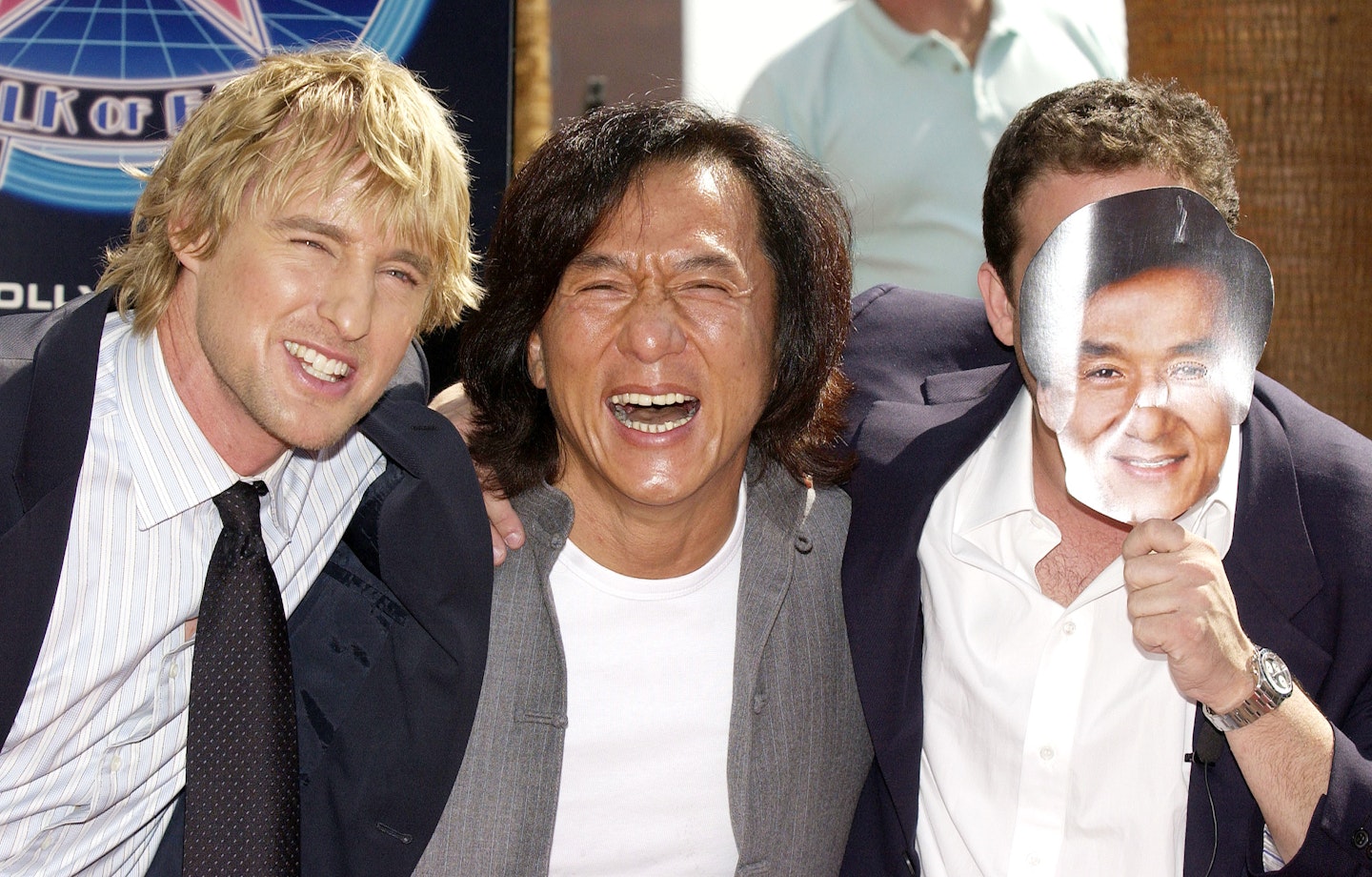
Chan’s dogged pursuit of perfection has earned him huge success not only in Asia, but in Hollywood. Though it took a few attempts: his first trip to America, in 1980, resulted in the dire Battle Creek Brawl, a small part in The Cannonball Run (he played a Japanese man) and a bruised ego; his second, in 1985, ended in the disastrous The Protector, the director of which insisted that Chan wield a gun rather than fists and feet (Chan later reshot the fight sequences and cut his own version). Since then he’s had plenty of misses Stateside, but also three Rush Hour films and The Karate Kid, which has made over $350 million worldwide.
Still, he’s not content.
“I get a pile of scripts from America: police from Hong Kong, CIA from Hong Kong, FBI from Hong Kong,” he says. “I say to my manager, ‘I don’t want to keep doing the same thing. What else?’ He gives me more: police from China, CIA from China, FBI from China...”
Chan takes a breath. “They will never let me do New Police Story. They will never let me do Rob-B-Hood. They will never let me do The Myth. It’s always another Rush Hour. Some company is trying to make another Shanghai Noon — Shanghai Dawn. After Karate Kid, people asked me to play the same character — a martial arts teacher — but teaching a young girl!” Frustrated, he keeps returning East to make more testing fare. In 2009, he shot Shinjuku Incident, an edgy thriller in which he plays an illegal immigrant drawn into Tokyo gang wars. And this year has seen the release of Little Big Soldier, a Midnight Run-style period road movie, which Chan developed over 20 years. While he once intended to play the heroic general, he ended up playing the more complex role, a sneaky, creaky-jointed deserter. “In Asia today, I can do whatever I like,” he says. “So I make films with no fighting, to show I can do so many other things. In America you’d think people would let me do these kinds of roles, but no. No way. That’s why I have to thank the Smith family and Sony Pictures. They had the guts to hire Jackie without fighting. At the end of Karate Kid, after Jaden’s battle, I was supposed to fight with the master, but they cut it out. It let the whole world see I could really act.”
Sometimes I have meetings at 4am. So much to prepare...
Given that Sylvester Stallone is a close friend, we wonder if Chan was offered a role in The Expendables. “No. Never. He’s a big hero. In the old days when nobody knew me, he was always talking about me. The first time I walked a red carpet in America was for Cliffhanger. He put a line about me into Demolition Man: ‘How’d you learn those kind of kicks?’ ‘Jackie Chan movies.’ I even acted in Burn Hollywood Burn, just because Stallone was in it. I would do any film with him.”
That’s not quite true. After all, Chan turned down the villain role in Demolition Man, a few years after declining to play a Yakuza boss in Black Rain. Despite his urge to push into darker waters, he remains concerned with preserving his image.
“Every film has to have a message,” he says. “I regret some things. When I made Drunken Master, it was, ‘Drink more! Fight! Drink more! Fight!’ People laughing? Good, more money! Then I grew up and realised I was influencing so many people. Even today, I go jogging in Africa and the children follow me, doing drunken-master style. I had to correct myself and make Drunken Master II — ‘Don’t drink, don’t fight!’ I felt a great relief. Now I have to be very careful what I’m talking, what I’m doing, what I’m filming. When I’m making a movie, I have to have a reason.”
He’s just as fussy about the TV he watches. “National Geographic and Discovery. History Channel. HBO. I see a lot of movies. If it’s good, I continue watching. If it’s bad, I turn. I can tell after one or two shots. Yesterday, the movie was with Denzel Washington and Julia Roberts. Good shots, good script! Then I flip channels. I see three children running away. There’s a box. Inside the box, a ghost’s face. I turn to Discovery.”
He asks Empire to turn off our tape recorder, while he rails against a popular, sexual-innuendo-laden comedy franchise. “There are so many things that are disgusting, ugly. In Hong Kong films, when they make love it’s like a porno! And violence. If you don’t show violence but you feel it, that’s a good director. Everybody knows how to do this...”
Chan launches into a mime in which he rips out Empire’s eyeballs and eats them.
“But the kind of director who does that is no good.”
He checks his watch. “Let’s continue this over dinnertime.”
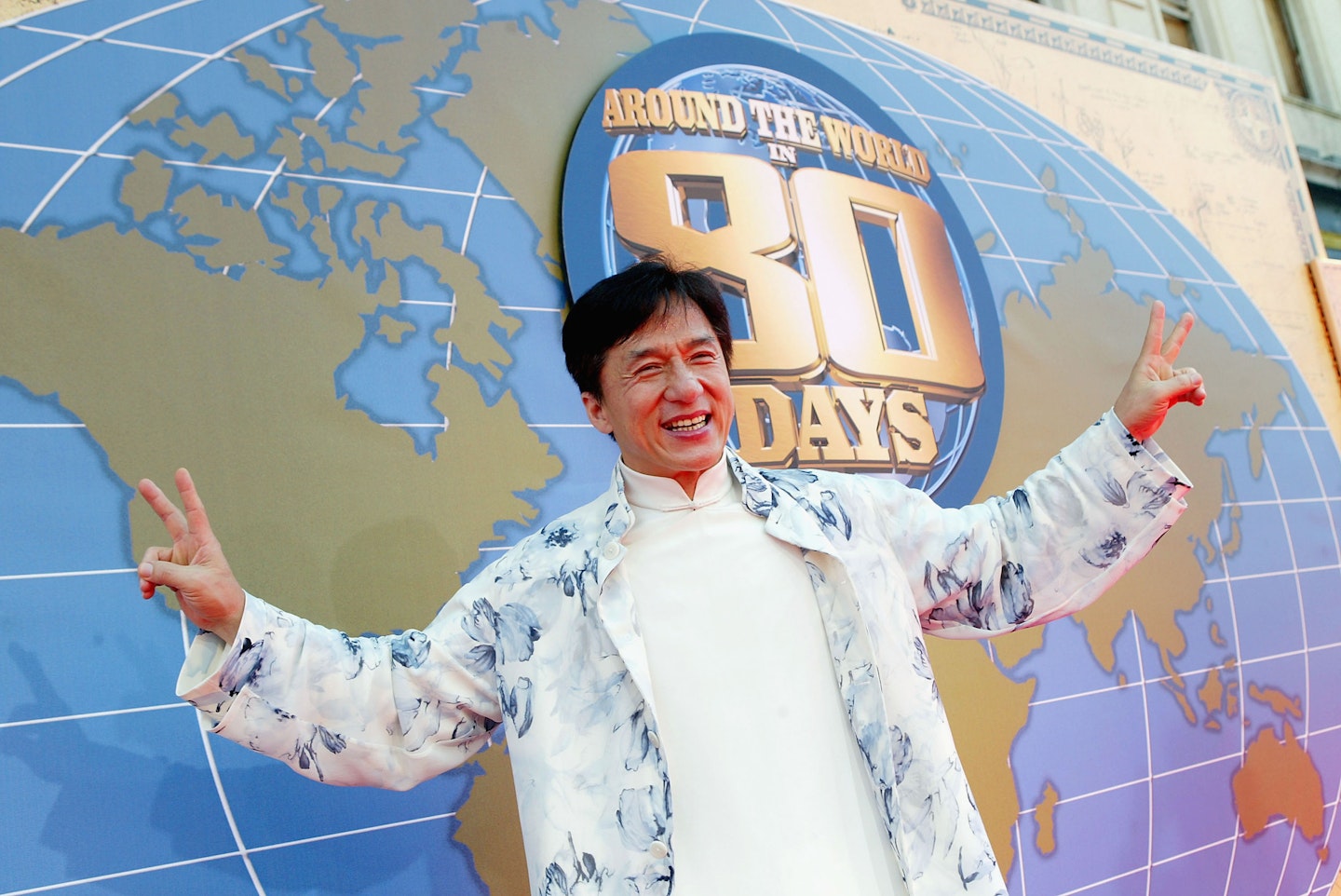
If you ever find yourself dining with Jackie Chan, there are three things you should know. 1) He eats like he drives, talks and kicks: fast. If at a rotating table, each dish will get just three go-rounds before it’s removed. 2) There will be pepper. Lots of pepper. 3) He has a prodigious appetite. His saying for those who can’t keep up: “Have a massage and take some medicine. In three days, you’ll be okay.”
Tonight, he’s chosen to eat at the hotel’s Japanese restaurant. There’s no bodyguard and no entourage — just Chan, his assistant, another female staff member, Empire and an English PR. Chan has decided to prepare the meal — a sukiyaki banquet — himself. After a starter of ocean shrimp, sea urchin and prawn tempura, he begins cooking beef sirloin in an iron pot. Dipped in egg, mixed with rice and chased down with plum wine, it’s a major step up from Empire’s usual repast.
Unfortunately, Chan’s mood has become more sour than sweet. Noticing that he’s lapsed into silence, we attempt to make small talk, asking about his trip to London for the premiere of The Karate Kid. He gives a few terse answers; then snaps, “You ask me what hotel I stay in! You ask me what TV I watch! Duh-duh-duh-duh-duh! I don’t know!”
For the hour that the dinner lasts, Chan rarely speaks. When he does, it’s mostly in Cantonese, although he does at one point turn to Empire and give us a sample of his Cockney accent, which he developed while bantering with the British crew of Around The World In 80 Days.
Finally, he pays the bill. Concerned that we’ve inadvertently offended him, we wonder if this is the end of the road. It’s not. Although it’s approaching midnight, Chan asks us to return to his room.
He gestures for us to sit down on the sofa, then cues up a DVD. A title comes up: “Jackie’s 3 Dreams”. The short film that comes on is comprised of clips of his prolific philanthropic work — a trip to Timor-Leste on behalf of UNICEF; aid relief to areas of China affected by natural disasters; donations from the Jackie Chan Charitable Foundation to schools and hospitals. The uplifting song on the soundtrack has subtitles: one line reads, “Dear child, you should remember/On the road you are not alone/We all need to endure hardships in this life.”
We’re particularly interested in the fact the film begins with footage of Chan being rushed to hospital after his worst-ever on-set accident, a simple tree fall on 1987’s Armor Of God that went horribly wrong, resulting in part of his skull shooting into his brain. It’s the closest he’s come to death, and we’re curious about why he’s included it here.
But now, we sense, isn’t the time to ask. We say goodnight.
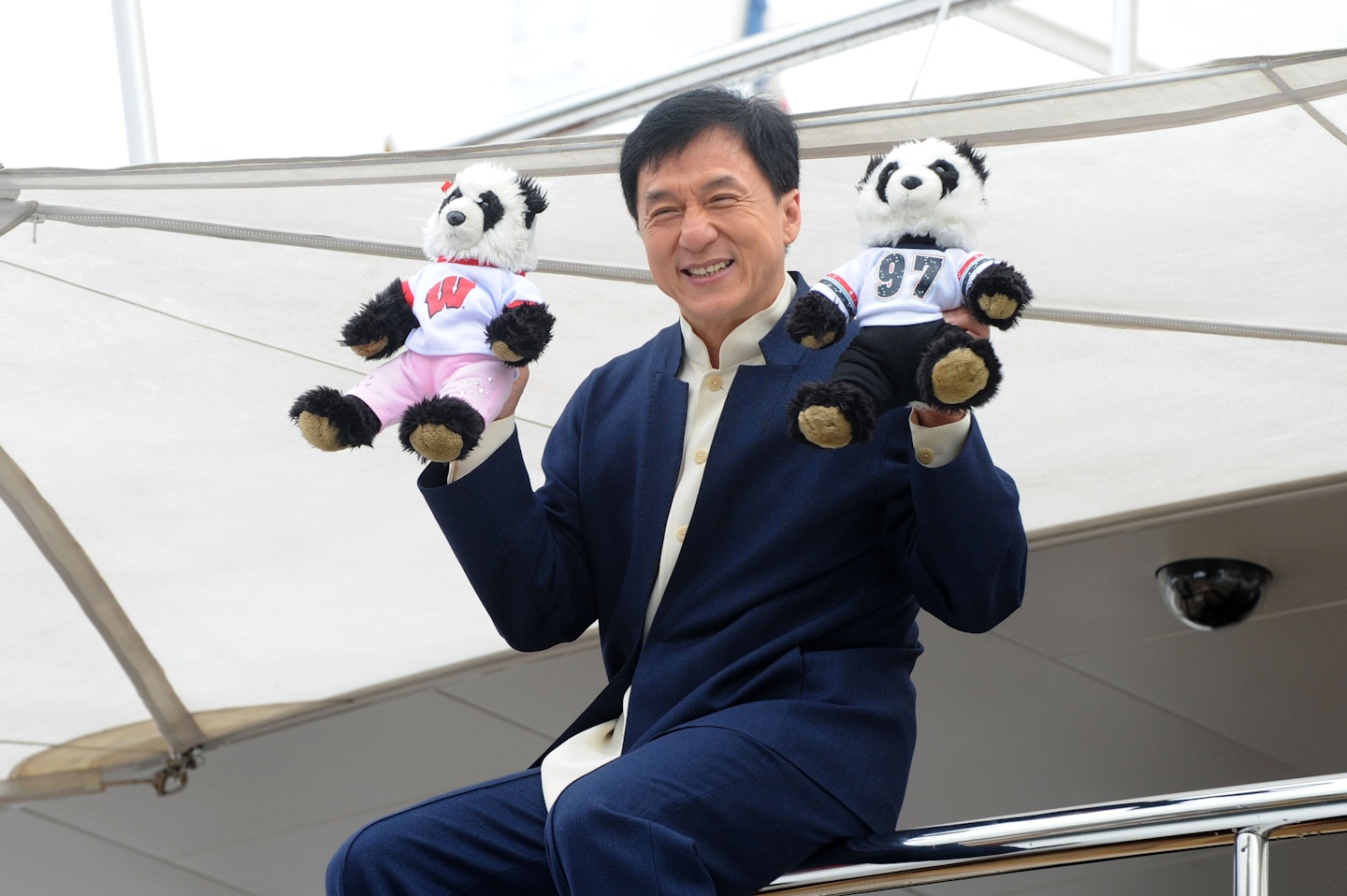
Chan is scheduled to spend his Saturday night recording a song for the upcoming Shanghai Expo event, and he wants us to come along.
At 6pm, we get into a van with members of Expo staff and head to the studio. Chan follows in his BMW. When we arrive, he disappears into the recording room. Empire heads into the booth, where sound engineers crouch over a mixing console, chain-smoking Baisha cigarettes.
Chan is a new man, refreshed and in high spirits. Despite struggling with one particular note, he stays calm, attempting it again and again. He once set a Guinness World Record by shooting more than 2,900 takes for a single action sequence; fortunately, tonight he nails the song in fewer than 20. After his first successful take, it’s announced that someone in the booth has forgotten to press record. Chan jokingly threatens to kill the culprit. He hits the note again. Another snafu. Finally, the song is in the can. The star comes to the booth and asks who messed up, then goes over to the nervous techie and shakes his hand.
Tonight, he’s accompanied by his “babies”, LA and ZY, two Build-A-Bear cuddly pandas. He found them at Hamley’s, the legendary London toy emporium, when he visited on a whim this summer. To allow Chan to shop in peace, the store activated its usual strategy when handling celebrity visitors, wheeling out a man dressed in a pirate costume to distract the crowds. Since then, LA and ZY have travelled everywhere with Chan — they even have their own “pawsports”, which are stamped each time they go to a new country. For the journey back from the studio, Empire is entrusted with carrying them.
During dinner, at an upmarket Shanghai eatery, the pandas sit beside their master. Also at the table are two of the key architects of the Jackie Chan Museum, which is due to open elsewhere in the city before the end of the year. Chan takes out an iPad and shows us blueprints and photos of the building: there’s a walkway with an impressive lightning effect; a walk of fame with tributes to everyone from James Cameron (who invited his fellow JC to visit Avatar’s LA set during filming) to friend and fellow martial arts legend Sammo Hung; and memorabilia from his career, including the giant tyre from Mr. Nice Guy, the bicycle from Who Am I? and the armour from The Myth.
“All my props and costumes, I put them there,” Chan says. “I want people to go in and see them. Now I’m planning Jackie Chan World — everything I’ve collected all these years will go in there. Teacups and saucers, cars, rocks, spoons. In my offices, so many shit! I’ve got six lofts in Hong Kong and if I want to find an Apple” — he gestures to his iPad — “I can’t find it anywhere. I have to buy a new one. So I want to give all my things away. One day, when I die, I want my bank account to be zero. Nothing.”
He also shares his other dream: to build the world’s greatest stunt school. “When I open it I want to visit twice every week. There is a lot to teach. But the most important thing for a stunt guy is personality — you have to be humble and happy to learn. Once I hired two of the best extreme fighters in Hong Kong to fight with me. A week later I said, ‘Get changed. Go home.’ They were flipping, kicking 360 degrees, screaming, doing incredible things, but they wouldn’t wait for me! A good stunt guy understands rhythm, timing, even editing and camera angles. Me, Bruce Lee, Jet Li, Stallone, we’re only good because the stunt guys are good.”
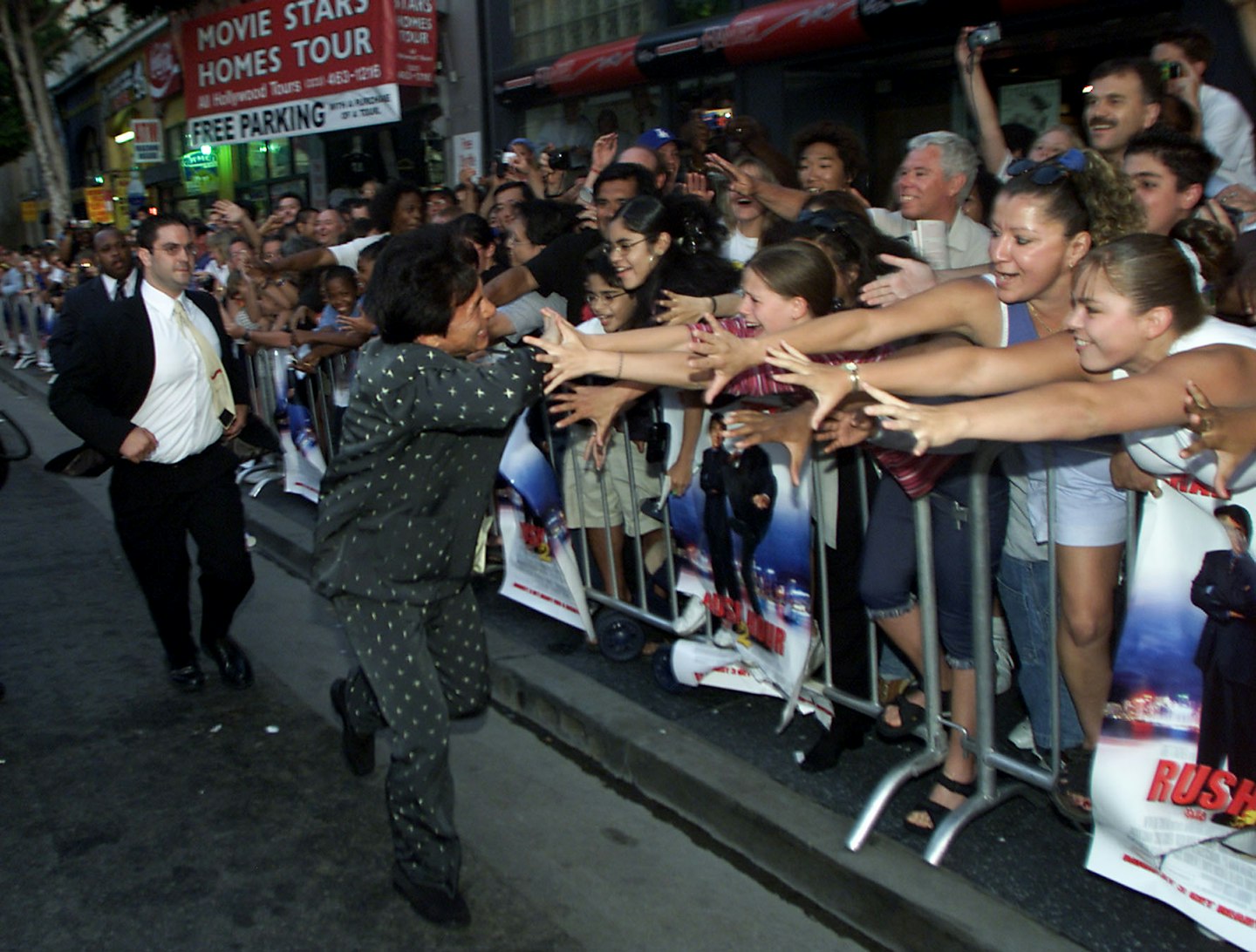
We walk back to the car park. En route, Chan covers his face with a large fan; even so, most of the people we pass on the street stop and gape. If Facebook weren’t restricted in China, a lot of statuses would be getting updated. One attractive young woman comes up and offers her business card. Probably wishing there was a man in a pirate costume around, Chan thanks her and takes it but keeps moving. Something he’d said the night before in his hotel suite comes to mind: “If I want to go outside and have a breathe, there are so many people looking at me that I run back. I cannot go out in China. Nowhere to go. The only thing to do is stay in and work.”
This time, Chan tells us to hop in his BMW. Pausing the playlist on the stereo — it includes Shakira’s Waka Waka, Justin Bieber’s Never Say Never (feat. Jaden Smith) and Akon’s Oh Africa — he sings us two of his own songs, a hearty anthem called Guóji (Country), which on its release last year was downloaded more than half a billion times, and the mournful Hard To Say Goodbye, written for the closing ceremony of the 2008 Beijing Olympics.
Rolling down the dark highway, he’s relaxed and happy. He tells us the story behind one of his greatest-ever gags — the hair-raising, Harold Lloyd-trumping fall from a clock tower in Project A. “Seven days I came to set. Seven days I made an excuse. ‘The sun’s in the wrong place.’ ‘Now there’s a cloud.’ Eventually, Sammo Hung came down. He wasn’t even in the scene. He said, ‘Goddammit, Jackie, you’re blocking the whole fucking street — either you’re going to jump or you’re not going to jump!’ I did it three times. Nobody can push me but Sammo...”
It seems hard to believe that Chan — the greatest daredevil cinema has ever known — isn’t immune to fear. But he shakes his head. “Every stunt, I get scared before. Every one. With jumps, I learned never to go to the top until the very last moment. You start thinking, ‘What if I land on my head? What if I break my back?’ So many thoughts. So I stay below, talking to my stunt guys, until the last moment. My heart always beating fast.”
It seems as good a time as any to bring up that Armor Of God clip. So, why would someone choose to repeatedly relive the darkest moment of their life?
“I watch it to remind myself,” he replies. “Because that accident changed me. In hospital I asked myself, ‘What have I done? All I do is fool around — big entourage, luxury cars, diamonds, women, fun...’ When I was 20 I was already a millionaire. I threw the cash around — buy, buy, buy! I don’t care; I want to play. On the set I’d be yelling and throwing the walkie-talkie on the ground. But then I realise, ‘Wow, people can die just in one moment.’ So now, I’m a different person. Whatever I do, I do the best I can. I want to do good. Good for my country. Good for the world. Before I wanted to have an Oscar. Now I want to make peace.”
Jackie Chan slips into a higher gear, cranks up the Lionel and speeds on into the night.
“All this fighting cannot get us very far...
If we don’t stop and see just who we really are...”
